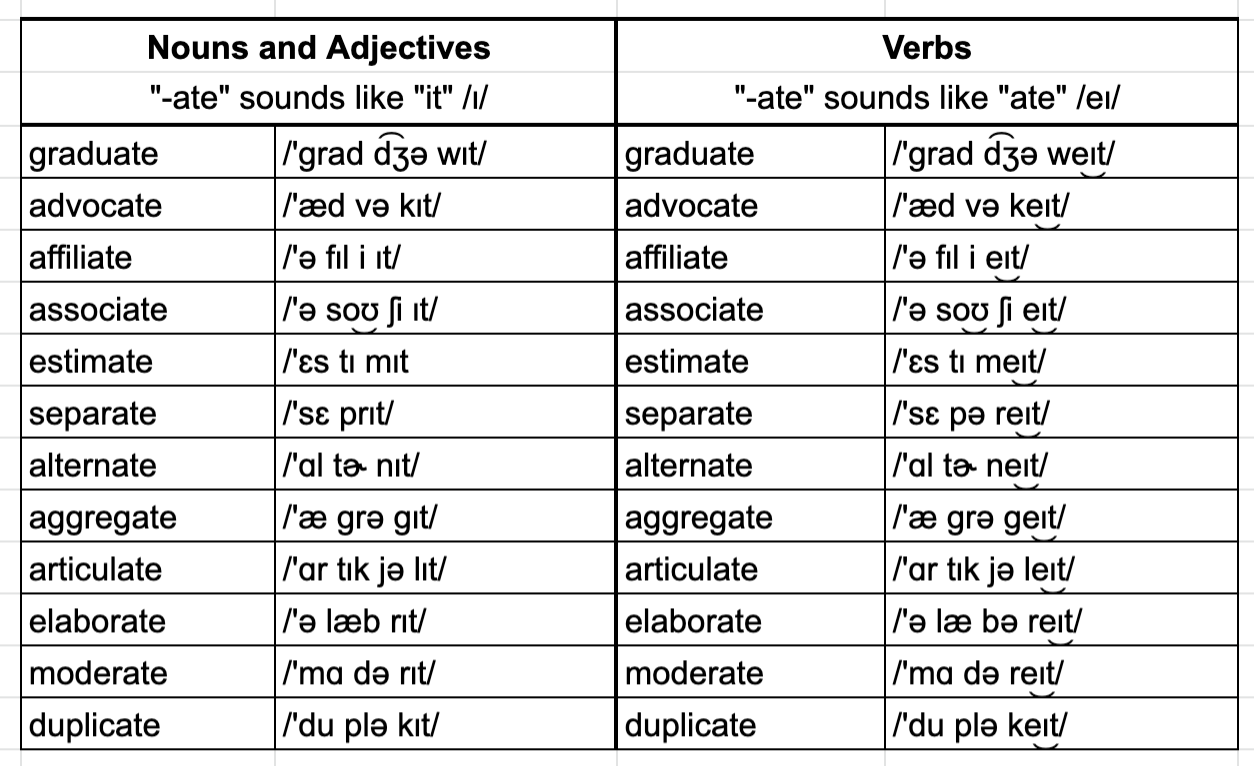When "ate" is "it"
When did the graduate graduate?

Sounds that change when spelling doesn’t
How do you pronounce this: “When did the graduate graduate?”
I made a video of me pronouncing all the words on this page.
If you think English spelling is crazy, keep in mind that what we see today has come a long way from what it used to be. The same spelling of the suffix “-ate” is currently used in nouns, adjectives, and verbs because they started as different sources in Latin then were changed in spelling, usage, and pronunciation as they were used in Old English.
Nouns - From Latin words ending with “-atus” and “-atum” and French words ending “-at” (the “e” was added).
Adjectives - From Latin words ending with past participle forms “-atus” and “-ata.”
Verbs - From Latin adjectives that became verbs in Old English.
So now we have the same spelling and word stress for some nouns, adjectives, and verbs, but the pronunciation changes for the “-ate” suffix. The part of speech of the word will determine which sound it is:
Nouns and Adjectives - pronounce the “-ate” suffix as /ɪ/ just like “it.”
Verbs - pronounce the “-ate” suffix as /e͜ɪt/ just like “ate.”
When did the graduate graduate? = When did the grad-ju-wit grad-ju-wait?
Exceptions
Actually, the changing pronunciation of the suffix “ate” IS the exception. Not all words ending in “-ate” can be used as both nouns or adjectives and verbs. The following are examples of consistent pronunciations.
I am using bold on the stressed syllables of all words.
Verbs
Almost all verbs ending in “-ate” follow the guideline that the stress is placed two syllables before the suffix and the “-ate” is pronounced as /e͜ɪt/ just like “ate.”
The stressed syllables in these kinds of verbs don’t change when the suffixes “-ed” or “-ing” are added.
Examples
calculate: calculated, calculating
generate: generated, generating
Stress moves to the syllable before the “-tion” suffix.
Examples
calculate: calculation
generate: generation
Examples of verbs ending in “-ate” that are pronounced as “ate”
calculate
illustrate
hesitate
celebrate
activate
designate
educate
fabricate
generate
indicate
navigate
speculate
tolerate
negotiate
investigate
Nouns
There are nouns that end in “-ate” that do not change to verbs or adjectives.
Examples of chemistry words ending in “-ate” that are pronounced as “ate”
acetate
bromate
carbonate
gluconate
oxolate
salicylate
zincate
There are a smaller number of general nouns that pronounce the suffix “-ate” as /ɪ/ just like “it.”
Examples of general nouns ending in “-ate” that are pronounced as “it”
climate
certificate
chocolate
senate
Adjectives
There are adjectives with the “-ate” suffix that do not change to nouns or verbs and the “-ate” is pronounced as /ɪ/ just like “it.”
Examples of nouns ending in “-ate” that are pronounced as “it”
accurate
immediate
intricate
fortunate
desperate
corporate
moderate
adequate
ultimate
private
doctorate
A few of the words above drop a syllable:
desperate = des-prit
corporate = cor-prit
doctorate = doc-trit
That’s a whole other complication with spelling/sound relationships in English!



